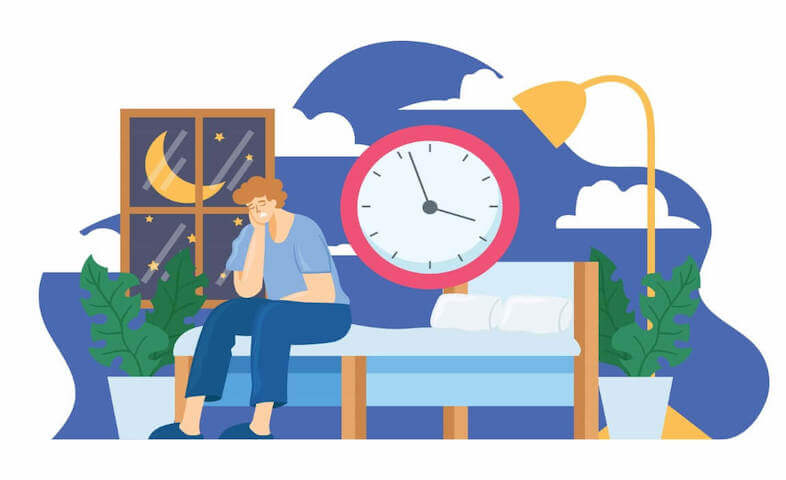How to Identify Your Sleep Chronotype and Sleep Better
- 01 Jun 2023
- -

Did you know there are three forms of sleep? Knowing your sleep chronotype allows you to sleep and live better. Discover how.

Did you know there are three forms of sleep? Knowing your sleep chronotype allows you to sleep and live better. Discover how.
What if I told you that if you learned a certain secret, you would automatically sleep deeper, wake up more refreshed, and have more energy for your daily activities?
The key is to recognize your sleep chronotype.
As Australia's premier sleep expert, I wrote a book about it called Bear, Lion, or Wolf: How Understanding Your Sleep Type Can Change Your Life. It would be my pleasure to educate you about your chronotype so that you can sleep, feel, and live better.
Sleep chronotypes, or your chronotype, while sounding complicated, are actually quite simple. It's a classification system for your circadian rhythm, which might be early, middle, or late:
However, your sleep chronotype recognizes much more than your regular sleep-wake patterns. Rather, it identifies peak hours of mental and physical productivity; your sleep requirements, common sleep saboteurs, ideal sleep tactics, and even personality factors.
As a result, below is a more complete outline of the three chronotypes from my book:
Greater quality sleep equals a greater quality living experience, period.
Consider the last time you awoke feeling refreshed, revitalized, and ready to take on the day. Imagine being able to reproduce this experience with a precise set of behaviors on demand. That is exactly what may and will happen if you follow this advice.
Here are a few other ways that knowing your sleep chronotype can help you sleep better:
After determining your sleep chronotype, you should adjust your sleep time and length accordingly. Because this timing corresponds to your peak melatonin levels - the master hormone that helps you fall and stay asleep - your sleep is likely to improve - think falling asleep faster and waking up less frequently during the night.
Bedtime anxiety is the experience of going to bed, lying awake, and being unable to sleep - which can occur when you go to bed at a time that is not in sync with your circadian rhythm, or when your melatonin levels are too low. As a result, while it is commonly stated that 10 p.m. is an ideal bedtime, this only applies to Lions. Bears and Wolves, on the other hand, should go to bed a little later, as this respects your melatonin peak and reduces the chance of bedtime anxiety.
While there are general rules for healthy sleep, such as avoiding screens an hour before bed and ingesting caffeine no later than 12 p.m., each chronotype has sleep saboteurs that are more likely to occur for them than others.
Lions, for example, have a proclivity for anxiety and must be very proactive in their anti-anxiety practices, such as meditation and exercise.
Bears, on the other hand, have a tendency to spend too much time on the couch in the evening, usually in front of the TV.
Finally, Wolves, who have the most energy in the evening and the least in the morning, should avoid sleeping in - while tempting, it just exacerbates your circadian phase delay and makes it more difficult to sleep at a suitable time that night.
While these issues face us all, regardless of chronotype, it's crucial to recognize that your sleep type predicts which ones are most relevant to you - so you can be aware and take stock before they occur.
Check out my bio for a link to the chronotype quiz on my website, which duplicates the quiz in my book, for the most dependable response. However, if you want to get an understanding right now while reading this post (I understand, time is valuable), then answer these five crucial questions.
My ideal bedtime, in comparison to others, is:
A - previously
B - at times earlier, at times later
C - in the future
How alert am I in the first hour upon waking?
A - a lot - that's when I do my finest work.
B - I'm awake enough to realize I need coffee right now!
C - not at all aware, and could easily go back asleep
When is my peak productivity?
Yes, hybrids occur, as do individuals who are on the cusp of two species, such as those who are close to the cut-off for Lions and Bears.
Similarly, it is critical to understand that chronotypes reflect our innate inclinations - which do not always manifest in reality.
Third, we only exhibit 80% of our chronotype qualities, thus you may identify with the traits of another sleep type. As a result, such considerations must be taken while determining the validity of your chronotype.
Dr Michael Breus[1], a fellow leading sleep expert, identified the dolphin chronotype based on his clinical practice with insomniac patients - meaning they have a haphazard sleep schedule, typically struggle to sleep, and suffer the consequences - depression, anxiety, burnout, compromised cognitive capacity, and memory loss.
My chronotype categories, on the other hand, are derived from the MEQ scale, a widely used psychometric exam that categorizes people into groups based on their morning and evening preferences.
A 2017 study from the University of Michigan Medical School[2] discovered that genetics, such as the PER1, 2, and 3 genes, and the (aptly called) CLOCK genes, account for 50% of your sleep personality. Endogenous (external) variables such as blue light, stress, nutrition, and lifestyle determine the other half of your chronotype.
Your circadian rhythm is any 24-hour internal clock, the most widely mentioned being your sleep-wake clock. Your chronotype, on the other hand, is a classification system for your sleep-wake cycle that is divided into Bears, Lions, and Wolves.
Share Your Thoughts 0